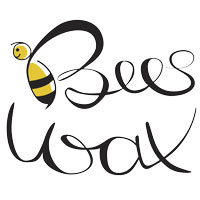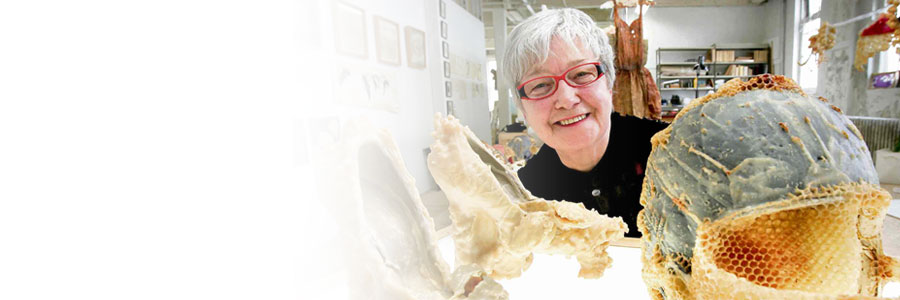Aganetha Dyck is a Canadian artist who is interested in environmental issues, specifically the power of the small. She is interested in inter species communication. Her research asks questions about the ramifications all living beings would experience should honeybees disappear from earth.
Dyck is using apiary feeder boards and hive blankets to develop her new body of work.
Aganetha Dyck was born in Marquette, Manitoba in 1937 and was raised in a Mennonite community. She moved with her husband and children to Prince Albert, Saskatchewan, in 1972, where she began to take courses at local art centres. From 1974 to 1976 she continued to raise her family while attending Prince Albert Community College in Saskatchewan. Moving her family back to Winnipeg in 1976, she worked on her art and later furthered her study of art history at the University of Winnipeg from 1980 to 1982.
Dyck’s early work is described as transforming domestic processes into fine art, thereby validating activities that are traditionally considered feminine. In her early work, Dyck used household materials such as buttons, wool fabrics, and cigarettes. A Winnipeg Art Gallery exhibition of Dyck’s work featured several hundred jars of buttons prepared and cooked using different culinary techniques.
Dyck is best known for her work with live honeybees, who she collaborated with between 1991 to 2010. Dyck placed interesting objects into beehives, or beehives into objects, and allowed the bees to build honeycomb on the objects, sometimes over the course of years. Her interest is in the inter-communication between species and would direct the bees to make their honeycomb marks on the objects by painting with perfumes and pheromones.
Dyck is well known for her transformation of commonplace objects such as shoes, buttons and figurines into things which are simultaneously metaphysical, delicate and sometime humorous. She shows us that the “exotic” can be found in the most mundane and everyday of things, if one examines them with an open mind. In one sense, she doesn’t transform an object as much as she liberates objects from familiar contexts, thus imbuing them with greater meaning. Her work is about ideas and thoughts, yet it always remains accessible and alluring to the viewer.
Dyck won the Governor General’s Award in Visual Arts and the Manitoba Arts Council Arts Award of Distinction in 2007.
Her work has been exhibited in galleries and museums across Canada and in England, France and the Netherlands. Her work can be found in the collections of such prestigious museums as the National Gallery of Canada, the Glenbow Museum, the Vancouver Art Gallery and the Yorkshire Sculpture Park in Britain.


